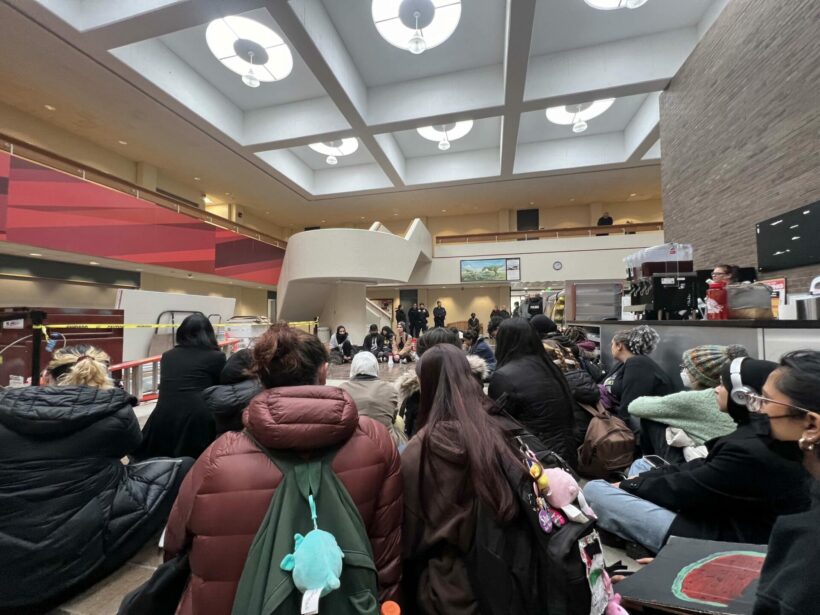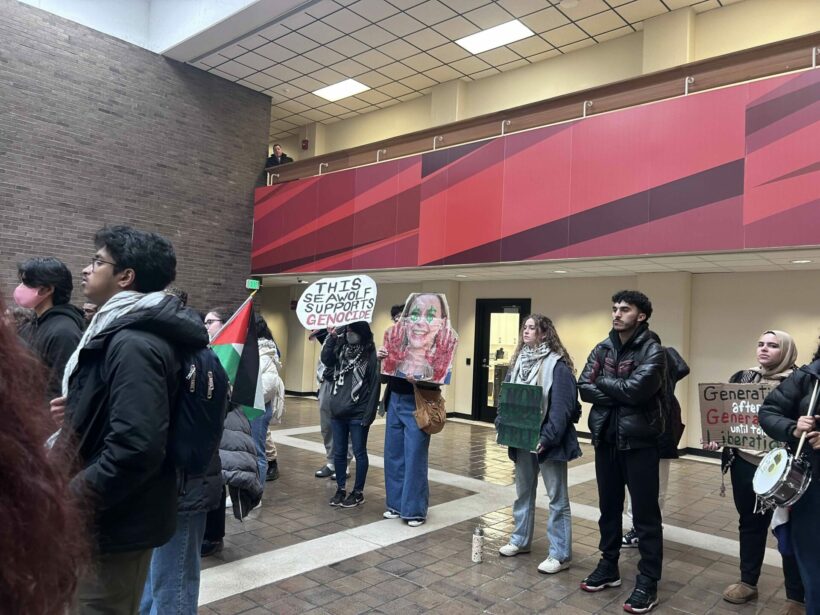The arrests of nine students during a March 26 protest at Stony Brook University (SBU) have prompted calls by SBU faculty for an investigation into why the arrests took place and how student dissent is policed on campus.
By Susan Perretti
According to Adam French, one of the arrested students, the charge was “congregat[ing] in a public space and refus[ing] to comply with a lawful order of the police to disperse.”
Demonstrators representing the student group, SB4PALESTINE, were arrested by SBU campus police while participating in a coordinated New York State-wide BDS (Boycott, Divestment and Sanctions) Day of Action held at various SUNY campuses. The SBU students had assembled in a common hall of the administration building to voice their concerns over the Israel-Gaza conflict and to demand that the university divest from funds that support Israel.
A faculty statement read the next day before a student and faculty sit-in claimed the arrests were “tantamount to criminalizing free speech and peaceful protest.” Among other things, it asked for “a full conversation and investigation” into who ordered the arrests, what are SBU policies to arrest peaceful student protesters, and why campus police banned two alumni from campus after they allegedly participated in demonstrations in support of current students.
A letter from Vice President for Student Affairs Dr. Rick Gatteau emailed to the campus community the day of the arrests states that protesting students disrupted activities inside the administration building “through the use of a bullhorn, a drum and loud chants,” and that Student Affairs staff warned organizers that their actions “violated the Code of Student Responsibility” and would be subject to arrest if they did not disperse.
“While we regret this outcome,” the letter continued in part, “it is our responsibility to protect the university from disruption and to hold students accountable for behavior that threatens the safety, security, and operations of the university.”
The faculty statement countered that “video footage, photographs, and eye-witness accounts from the event depict students sitting in silence” and that, “as such this was an entirely peaceful protest.”
“We think the university should think long and hard about how [the March 26 arrests] will reverberate across our campus and how it might send a chilling response about the use of campus police, the intolerance to peaceful protest, and criminalizing free speech and peaceful campus protest.”
A spokesperson from the SBU President’s Office referred a reporter’s request for comment to the Student Affairs letter.
About two dozen faculty members joined approximately 100 students and several local residents at Wednesday’s sit-in, held in the same common hall of the administration building where the arrests took place the day before. Also attending were about nine campus police officers and three staff members identified as being from the Student Affairs Office who stood apart from the seated students and faculty and did not speak.
At Wednesday’s sit-in, some of the arrested students verbally confronted Student Affairs staff, saying they failed to support them during the arrests. “They allowed us to be arrested,” said SB4PALESTINE co-founder Zubair Kabir, addressing one of the staff members directly. “You put your head down and you know me. How dare you? Don’t you feel guilty? You let your own student be arrested.”

The staff member left abruptly without commenting.
“The Constitution, the First Amendment, goes out the window as soon as you challenge the status quo,” added Kabir, a pre-med student. He claimed that since SB4PALESTINE formed five months ago university administrators have been “constantly harassing us.”
“I can get arrested one day and the next day my money goes to this university so I can get a degree,” Kabir said. “But what does my degree stand for if [the SBU Administration] stand[s] for genocide. If you’re not making them uncomfortable it’s not a protest, it’s a parade.”
SB4PALESTINE board member Adam French said that prior to the arrests, Student Affairs staff “repeatedly told us to think about our own futures. But how can we think of our futures when the people of Palestine are being starved?”
A Palestinian student also addressed a Student Affairs staff member whose class she had taken.
“I saw you as a mentor,” she said. “I enjoyed that class. It made me an activist. I moved here from the Middle East so I could speak and that is what I am going to do until the day I die.”
Dr. Abena Asare, Associate Professor of Modern African Affairs & History, noted that student protest has a long history at SBU.
“Our department only exists because black and brown students in the year 1968 decided to sit in and do something,” she said, adding that students currently organizing around the Palestinian issue “are educating the current administration. This is a master class for this administration.”
According to its website, SUNY BDS is a coalition of undergraduate students, graduate students, faculty and staff members from across the SUNY system “committed to supporting the fight for Palestinian liberation by bringing an end to SUNY’s relationship with the state of Israel.” Its objectives include “ending recruitment to major weapons manufacturing companies, divesting endowments and pensions from funds that support Israel, and implementing cultural boycotts of Israeli universities and academics and economic boycotts of organizations that profit from and perpetuate the [Palestinian] genocide.”
A SUNY BDS student spokesperson said that “to our knowledge, Stony Brook University was the only university to order the arrest of any students at our statewide Day of Action.” Eleven SUNY campuses held events marking the day.
SB4PALESTINE on Thursday announced that a new organization, SBUALUMNI4PALESTINE, was launched on Instagram. Among other things, the two groups are demanding that charges against the arrested students be dropped. A joint April 3 protest is planned at the SBU campus.










